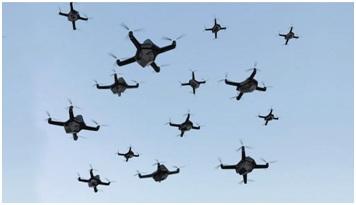The swarm drone system equipped with cutting-edge technology that can identify targets using artificial intelligence-driven software is being inducted into the mechanised forces of the Indian Army.
Swarm drones consist of a number of drones controlled from the same station which can be programmed using an algorithm to carry out various tasks, including surveillance, sources said. The Indian Army on Friday took to Twitter and said the new system will provide an “edge” to it in meeting future “security challenges”.
“#Swarm Drones being inducted into the Mechanised Forces, duly embracing the niche & disruptive technologies, will provide an edge to #IndianArmy in meeting future security challenges. #AtmaNirbharBharat #IndianArmy #InStrideWithTheFuture,” the Additional Directorate General of Public Information of the Army tweeted. The sources said using algorithms a swarm drone can be cast to carry out tasks such as surveillance.
There is a dynamic mesh communication system so that “even if a few drones drop out, the swarm will still complete the job and come back”, they said. It is a complex but a “man in the loop” system, the sources added.
The Army is endeavouring to “embrace emerging and disruptive technologies” to transform itself to a “technology-enabled force to meet future operational challenges”, they said.
The AI-infused system enhances decision-making and engagement capability, the sources said.
“Swarm drones consist of a number of drones controlled from the same station and can carry a variety of payloads in a single mission, thus capable of overwhelming enemy defences by undertaking collaborative attack,” another source said.
The algorithms and AI software enable them to “operate autonomously with minimum human intervention” and to identify targets using the software thus “speeding up the engagement process,” the sources said.
The Army has initiated a Make II case Autonomous Surveillance and Armed Drone Swarm (ASAD-S) with adequate ranges to “neutralise adversary targets in depth areas,” they said.








